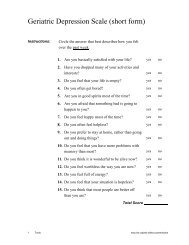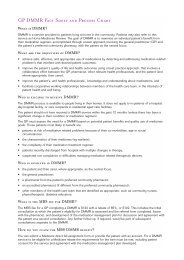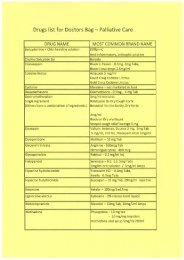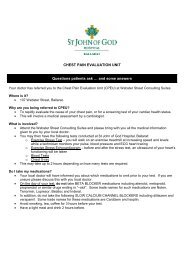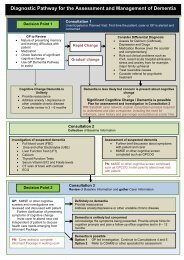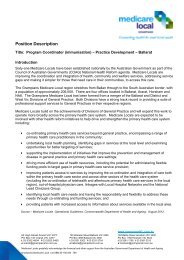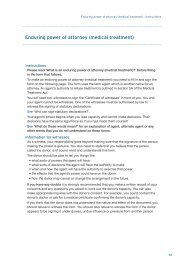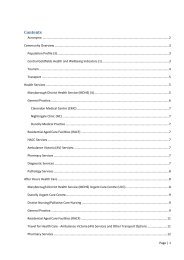Problem solving help sheet PDF
Problem solving help sheet PDF
Problem solving help sheet PDF
Create successful ePaper yourself
Turn your PDF publications into a flip-book with our unique Google optimized e-Paper software.
2CHANGED BEHAVIOURSAND DEMENTIAABOUTDEMENTIAFatigueDisrupted sleep patterns can cause angryor agitated behaviour.Physical discomfortThe person may be hungry or bloated or need togo to the toilet, be too cold or too warm.Unmet emotional and physical needsPeople with dementia still want to feel useful andneeded, that they belong, are included and that theirexisting skills are utilized. A person may react in anegative way if any of these needs are not addressed.The person’s historySometimes the person may think in the past and thiscan explain what appears to be an unusual behaviour.For instance, the person may be looking for the toiletand go out the back thinking of the outside toilet theyused as a child.The environmentEnvironment too largeSometimes the physical space in which a personwith dementia is living is overwhelming.Too much clutterSometimes there is too much in theenvironment for the person to absorb,and they may become overwhelmed.Excessive stimulationWhen there is too much going on in theenvironment, such as music or television in thebackground during conversation or there are toomany people around, the behaviour of someonewith dementia may change.Confusing sensory environmentsLighting, visual contrasts between floors and walls,the use of colours can all affect a person’sbehaviour and level of functioning. Inadequatelevels of light may affect their ability to concentratewhile eating. Patterned floor tiles can look like steps,causing the person to trip or become uncertain.Glare from direct sunlight or a highly polishedfloor can affect a person’s ability to see.Shadows can contribute to hallucinations.Changing routinesPeople with dementia need a certain amount ofroutine and daily structure on which they can depend.This consistency is important in <strong>help</strong>ing to minimisethe amount of stress they may be experiencing.Unfamiliar environmentAn environment that is new or unfamiliar is morelikely to be confusing for a person with dementiabecause they experience problems with newlearning, memory and perception.The taskTask too complicatedSometimes people with dementia are asked to dotasks that are now too difficult due to theprogressive nature of dementia, even though theymay have been able to do them previously.Task unfamiliarPeople with dementia gradually lose their ability tolearn new tasks or skills. Expecting that they willlearn may place an unrealistic demand on them.Causes related to communicationPeople with dementia may become angry or agitatedbecause they do not understand what is expected ofthem or they misunderstand what others may besaying. They may also feel frustrated with theirinability to make themselves understood.<strong>Problem</strong> <strong>solving</strong>Make a plan and try it. Develop a list of alternativestrategies for responding to the behaviour orsituation. Be creative. Have someone else look at thesituation and give suggestions. Think about thestrategies you have identified. Decide on the one youare going to try first.Review the strategy. <strong>Problem</strong> <strong>solving</strong> is a process oftrial and error. There are no simple solutions. If thenew strategies you tried did not reduce the changedbehaviour as you had planned, try other strategies.Who can <strong>help</strong>?Discuss with the doctor your concerns aboutbehaviour changes, and their impact on you.FURTHER INFORMATIONAlzheimer’s Australia offers support, information,education and counselling. Contact the NationalDementia Helpline on 1800 100 500, or visit ourwebsite at fightdementia.org.auFor language assistance phone theTelephone Interpreter Service on 131 450This publication provides a general summary only of the subject mattercovered. People should seek professional advice about their specific case.Alzheimer’s Australia is not liable for any error or omission in this publication.© Alzheimer’s Australia 2012Reviewed March 2012




